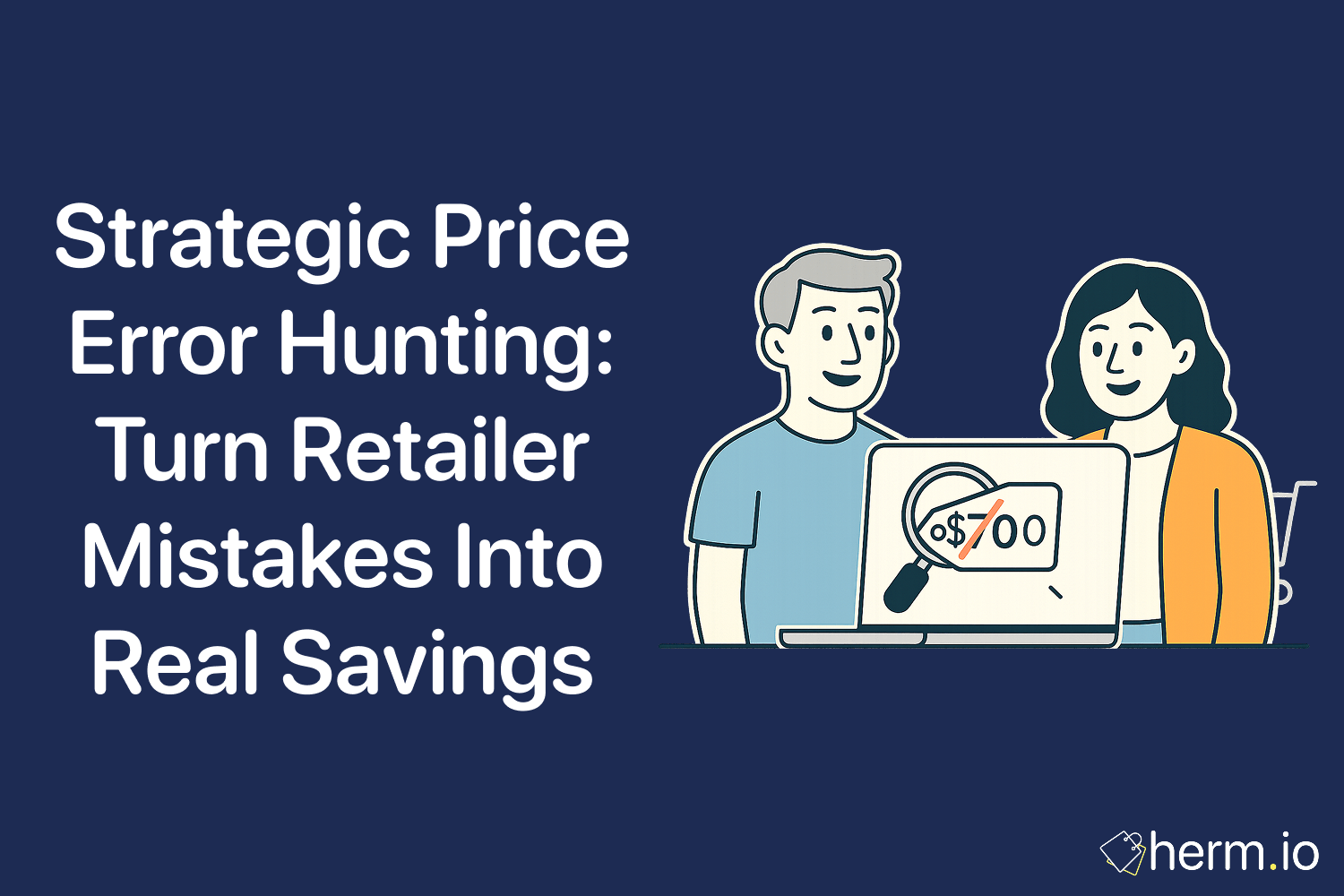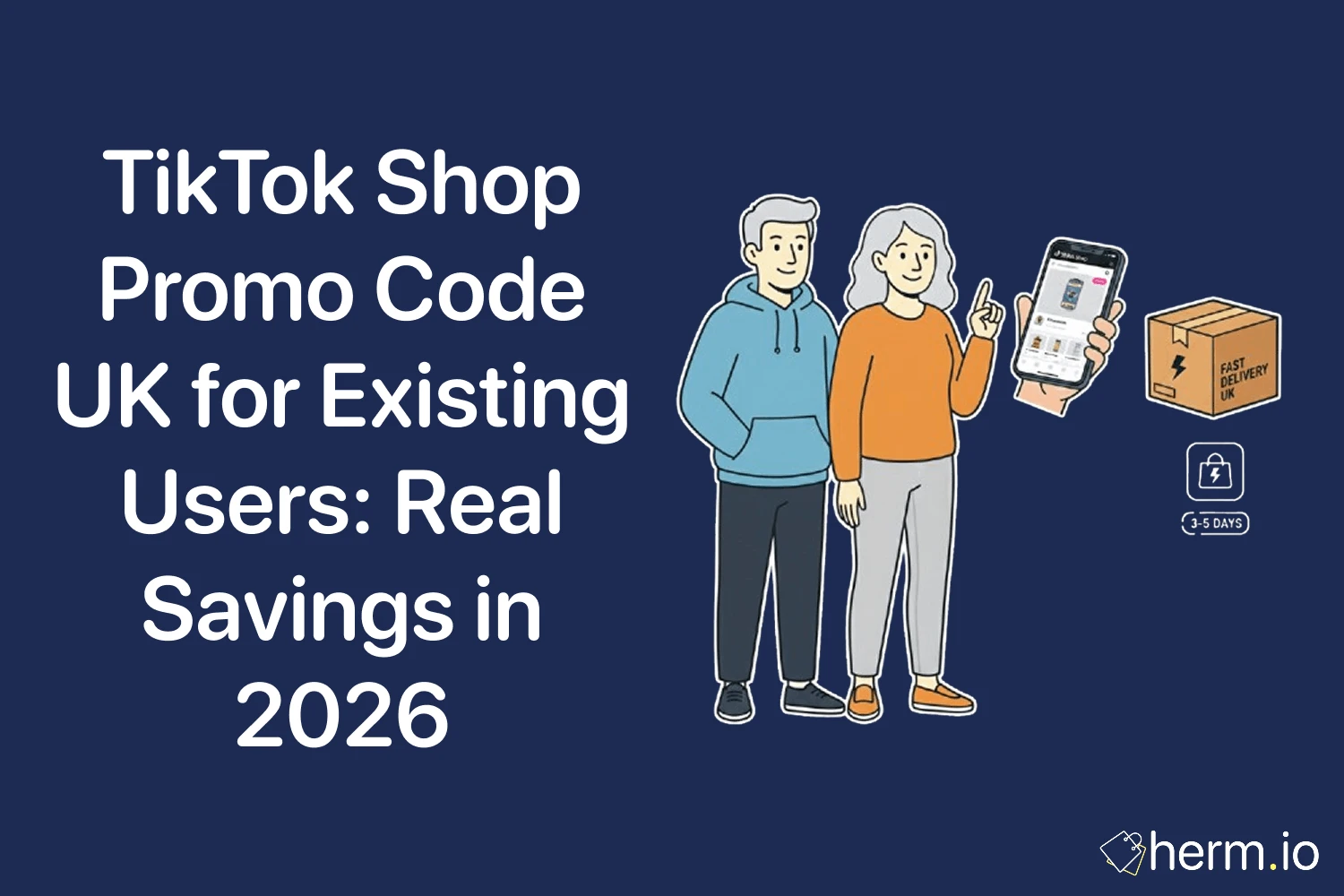
TL;DR: Quick Wins
- Master systematic techniques for spotting legitimate pricing errors across major retailers
- Understand exactly when retailers are most likely to honour mispriced orders versus cancel them
- Build an efficient alert system that brings profitable mistakes directly to you
- Apply proven strategies that increase your success rate while staying completely ethical
Most pricing errors get cancelled—that's the reality. But with the right strategic approach, you can significantly improve your odds of securing legitimate misprices while building sustainable shopping habits that save money month after month.
Quick Tips: Implement These Today
- Set up price alerts for specific SKUs rather than browsing randomly
- Screenshot product pages before checkout to document pricing errors
- Target variant-specific misprices (different colours or sizes of the same product)
- Use retailer apps and desktop sites interchangeably—pricing lags create opportunities
- Focus on dispatch confirmations rather than order acknowledgements for stronger claims
The Strategic Foundation: Understanding Real Price Mistakes
Successful price error hunting requires precision, not luck. You're targeting systematic anomalies in retailer pricing feeds, not hoping for random discounts.
Legitimate pricing errors follow predictable patterns. Missing zeros transform £499 coffee machines into £49 bargains. Currency conversion glitches create temporary windows where GBP prices display with EUR calculations. Promotional stacks malfunction, making bundles cheaper than individual items. These errors share common characteristics: they're clearly unintentional, affect specific variants or time periods, and usually get corrected within hours.
The key insight most shoppers miss is timing. Pricing errors cluster around system updates—late-night inventory pushes, seasonal changeovers, flash sale launches. Smart hunters target these windows rather than scrolling endlessly through normal retail pages.
Identifying Profitable Anomalies
Your success rate improves dramatically when you understand what constitutes a genuine pricing error versus a standard promotion. Real mistakes create logical inconsistencies in retailer pricing structures.
Compare variants systematically. If a blue jacket costs £89 while black, grey, and green cost £189, you've found a variant misprice. Check bundle mathematics—when adding accessories reduces the total price below the main item's cost, promotional logic has failed. Examine cross-channel pricing between mobile apps and desktop sites; technical lags often create temporary arbitrage opportunities.
Product grading errors offer consistent wins. Retailers sometimes mislabel "like new" refurbished items with "acceptable condition" pricing, creating instant £50-100 discounts on electronics and appliances.
Systematic Discovery Methods
Effective price mistake hunting uses retailer features strategically rather than relying on random browsing.
Advanced Sorting Techniques
Transform basic retailer search into a discovery engine. Sort categories by lowest price first, then apply filters for specific brands, sizes, or features. Outliers become immediately visible when a premium brand appears below budget alternatives.
Target clearance and outlet sections methodically. These areas accumulate pricing inconsistencies as inventory management systems struggle with discontinued lines and grading errors. Check them weekly rather than daily—significant errors take time to accumulate.
Cross-reference first-party versus marketplace pricing on platforms that support both. Retailers often push pricing updates to their direct sales channel before synchronising with marketplace feeds, creating temporary gaps.
Building Your Alert Infrastructure
Manual hunting wastes time. Build systems that surface opportunities automatically.
Configure price tracking tools with specific thresholds for products you actually buy. Set alerts 20-30% below normal retail rather than hoping for extreme discounts—moderate misprices get honoured more frequently than obvious errors.
Subscribe to curated deal communities rather than following every available source. Identify 2-3 reliable curators who timestamp posts, share proof, and correct themselves when deals expire. Quality beats quantity for actionable intelligence.
Monitor back-in-stock notifications for items you've previously tracked. Inventory restocks often revert to outdated pricing, creating brief windows before corrections apply.
The 30-Second Verification Protocol
Speed matters, but verification prevents wasted effort on false alarms.
Document the opportunity immediately. Screenshot the product page with visible pricing and timestamp. Add the item to your basket and proceed to checkout—many pricing errors only surface during payment processing.
Test variant consistency. If only one colour or size shows the error price, you've likely found a genuine mistake rather than a site-wide promotion. These variant-specific errors often persist longer and get honoured more frequently.
Verify seller information and shipping terms. Marketplace sellers have different cancellation policies than direct retailers. Factor shipping costs into your calculations—a £10 discount becomes worthless with £15 expedited delivery fees.
Review the retailer's terms and conditions quickly. Look for "obvious error" clauses that explicitly allow cancellations for pricing mistakes. This information helps set realistic expectations for order completion.
Understanding Retailer Honor Rates
Different types of pricing errors have vastly different success rates. Understanding these patterns helps you prioritise your time and energy.
Contract Formation Reality
Most online product pages represent invitations to treat, not binding offers. Your order constitutes the offer; the retailer accepts at dispatch or through explicit confirmation emails. Payment authorisation alone rarely creates binding contracts when obvious errors exist.
Orders with dispatch confirmations achieve significantly higher honor rates than simple order acknowledgements. "We've received your order" typically indicates pending review, while "Your order has been dispatched" suggests completed acceptance.
Click-and-collect orders occupy middle ground—payment for collection sometimes equals dispatch status, depending on retailer policies and local regulations.
Maximising Honor Probability
Certain factors consistently improve your chances of keeping mispriced orders.
Order early in the error window. First buyers often receive processing priority before manual reviews identify pricing problems. Avoid contacting customer service unnecessarily—proactive contact can trigger manual cancellation reviews.
Choose standard shipping over expedited options. Faster shipping draws attention to orders that might otherwise process automatically through fulfillment systems.
Maintain clean account history. Frequent returns, chargebacks, or previous price error claims reduce goodwill and increase scrutiny on borderline cases.
Community Intelligence Networks
Solo hunting limits your opportunities. Strategic community engagement multiplies your discovery rate.
Selecting Quality Sources
Focus on communities that demonstrate consistent value rather than maximum reach. National deal forums with dedicated "misprice" sections offer higher signal-to-noise ratios than general bargain groups.
Telegram and Discord channels provide real-time notifications, but require careful curation. Follow channels that post verification screenshots, timestamp discoveries, and maintain post-error update threads.
Niche communities often spot category-specific errors first. PC component forums, sneaker groups, and home automation communities monitor their sectors intensively and share findings quickly.
Community Contribution Strategy
Effective community participation improves your access to premium intelligence. Share successful claims with proof (redacting personal information), report when errors get corrected, and contribute original discoveries rather than only consuming others' findings.
Avoid overwhelming retailer customer service systems. Coordinated community rushes on support departments reduce honor rates for everyone. Practice restraint and encourage others to do the same.
Ethical Implementation Framework
Sustainable price mistake hunting requires ethical boundaries that protect long-term opportunities.
Retailer Impact Assessment
Distinguish between pricing errors that affect global corporations versus small independent sellers. Large retailers build error margins into their operational models; small shops cannot absorb significant pricing mistakes without real financial harm.
Respect quantity limitations and avoid circumventing purchase limits through multiple accounts. These restrictions exist for practical reasons—honored orders often come with implicit quantity caps regardless of stated limits.
Sustainable Practices
Buy items you genuinely need rather than speculating on resale opportunities. Returns create logistics costs, environmental waste, and policy restrictions that affect all price mistake hunters.
Document your success rates by retailer and error type. This data helps you focus efforts on highest-probability opportunities while avoiding retailers with consistently poor honor rates.
Advanced Implementation Strategies
Experienced hunters employ specific techniques that casual shoppers rarely discover.
Cross-Channel Arbitrage
Retailers often update pricing on primary platforms before synchronising with mobile apps, affiliate feeds, or international sites. Monitor your target retailers across multiple channels during known update windows.
App-specific pricing lags occur frequently during major sales events when mobile platforms struggle with high traffic loads. Complete purchases through whichever channel shows lower pricing, but verify checkout completion before assuming success.
Promotional Stack Analysis
Complex promotional interactions create mathematical errors in pricing calculations. Student discounts, loyalty point multipliers, and seasonal promotions sometimes combine incorrectly, producing prices below cost.
Identify retailers with complex promotional structures and monitor them during overlap periods—when old promotions expire while new ones activate, temporary calculation errors often emerge.
Timing Optimisation
Pricing errors follow predictable schedules. Sunday evening through Tuesday morning sees increased error rates as retailers push weekly updates. Major sale preparation periods (pre-Black Friday, seasonal transitions) generate system stress that creates pricing inconsistencies.
Monitor retailers during their specific update windows. Many UK retailers push pricing changes between 11 PM and 2 AM GMT; international retailers often update during their local business hours, creating offset opportunities.
Post-Purchase Management
Your strategy doesn't end at checkout. Post-purchase behavior significantly affects outcome probability.
Communication Protocols
Avoid unnecessary contact with customer service teams. Proactive inquiries about pricing errors often trigger manual reviews that lead to cancellations. Wait for natural order processing to complete before engaging support.
When cancellations occur, respond professionally and request goodwill gestures politely. Many retailers offer discount vouchers or expedited shipping credits to maintain customer relationships after pricing error cancellations.
Success Rate Tracking
Maintain records of your price mistake hunting results. Track retailer honor rates, error types with highest success rates, and community sources with best accuracy. This data guides future strategy optimisation.
Document seasonal patterns and retailer-specific behavior. Some shops consistently honor small errors while cancelling large ones; others apply blanket policies regardless of error magnitude.
Frequently Asked Questions
Can retailers legally cancel my paid order for a pricing error?
Most retailers reserve cancellation rights for obvious errors in their terms and conditions. Payment authorization alone rarely creates binding contracts when genuine mistakes exist. Dispatch confirmations strengthen your position significantly, but cancellation rights often remain valid even after payment processing.
How do I know if a pricing error will be honoured versus cancelled?
Error magnitude, retailer size, and order processing stage determine likelihood. Moderate discounts (20-50%) on major retailers with dispatch confirmations achieve highest honor rates. Extreme errors (90%+ discounts) rarely survive manual review regardless of retailer policies.
Should I contact customer service about a potential pricing error?
Generally no. Proactive contact often triggers manual reviews that lead to cancellations. Allow normal processing to complete first. Contact support only after receiving cancellation notices, and request goodwill rather than demanding honor.
What constitutes ethical price mistake hunting?
Use public retailer features normally, respect purchase limits, avoid automation or multiple accounts, focus on legitimate shopping needs, and accept cancellations gracefully. Skip errors that would genuinely harm small independent retailers.
Strategic price mistake hunting delivers consistent results when you apply systematic methods rather than relying on luck. Focus on building sustainable practices, maintaining ethical standards, and developing expertise in specific retailer behaviors.
Your approach should emphasise quality opportunities over quantity attempts. One successfully honored significant error often produces more value than dozens of cancelled small ones. Build expertise methodically, contribute to communities responsibly, and maintain perspective on the broader goal: sustainable savings through strategic shopping rather than gambling on unrealistic discounts.

Élodie Claire Moreau
I'm an account management professional with 12+ years of experience in campaign strategy, creative direction, and marketing personalization. I partner with marketing teams across industries to deliver results-driven campaigns that connect brands with real people through clear, empathetic communication.

.png)

.webp)






.png)

.png)
.png)
.png)